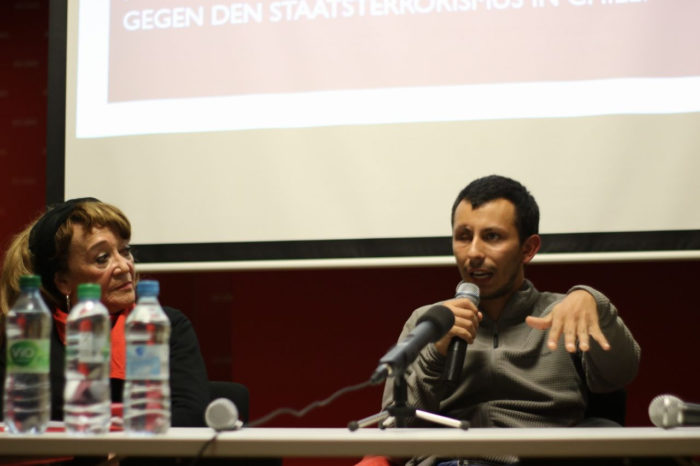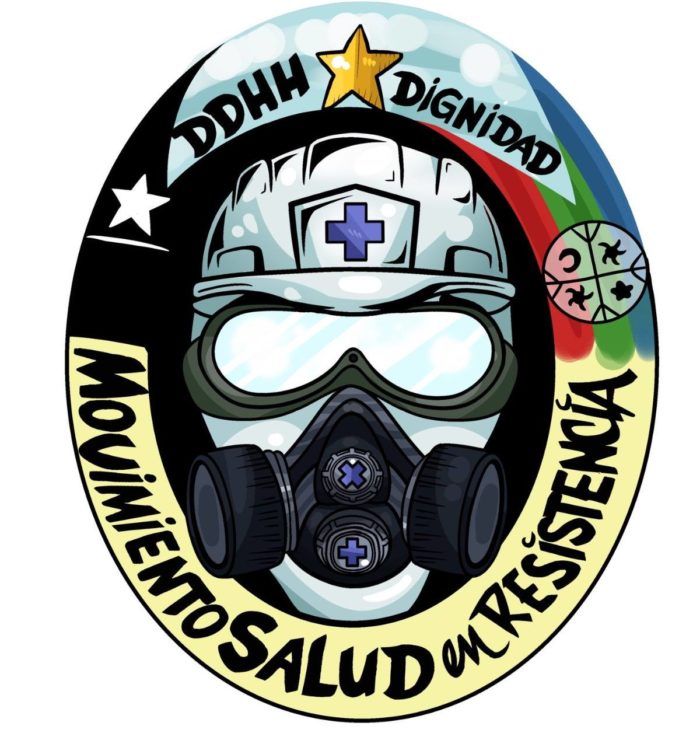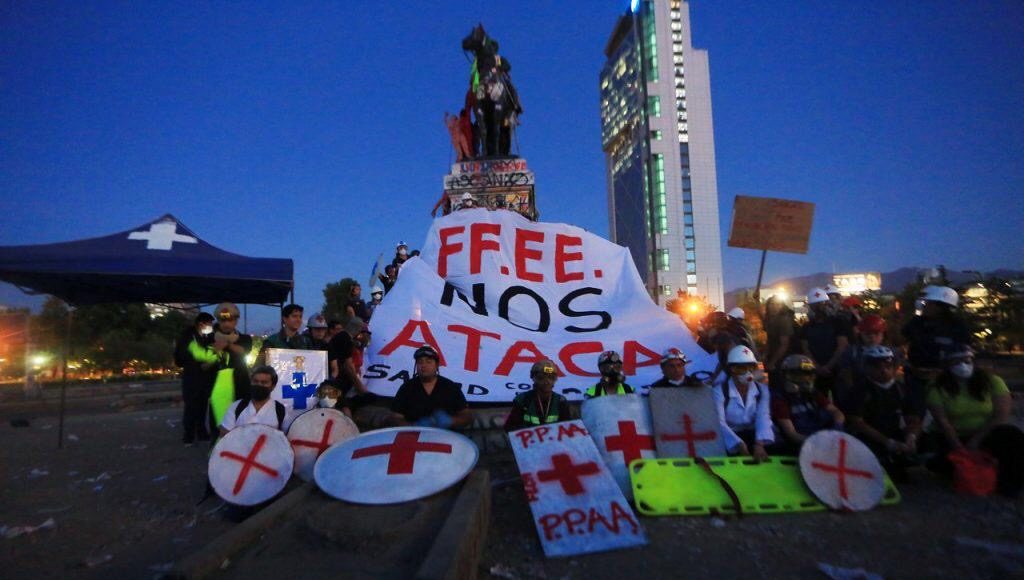This is the second of two articles with testimony from Chile’s protest movements. The first can be read here.
See also our January article ‘Chile’s long hot summer of discontent‘
Stop Press: there were new street protests in Santiago over the weekend of 16-17 April in the El Bosque neighbourhood, amid tensions over food shortages. Following a recent surge in coronavirus cases, the whole of Santiago is in strict lockdown, reducing poorer residents to severe hardship. The police reverted to their tactics of brutal repression.
Chile’s monumental protests against inequality have been halted after six months with the outbreak of Covid-19. Yet while the streets have largely emptied, it is reassuring to see that rather than being forgotten in the midst of the pandemic, the protests have instead been transformed into new forms of organisation and expression. However, the key demands for – a more equal society, with decent quality of life for all and a re-write of the dictator-era constitution – remain unanswered, with the referendum postponed until October.
The fear is that the Covid-19 emergency will also enable the government to postpone a response to demands for justice for the 30 dead and thousands injured during the protests.
The protests which began in October 2019 made apparent a slow burning, discontent that had been steadily brewing over decades threatening to bubble over with each new insult – poverty level pensions, unequal access to decent education and health services. Critical mass was reached last year when students dodged the Metro turnstiles in Santiago in defiance of the $30 CLP fare rise (£0.03). This was, as protestor Matías Orellana described ‘the straw that broke the camel’s back.’ He adds, ‘We believe this is not just about $30, but about more than 30 years of abuse. Since democracy came back to our country, nothing changed, absolutely nothing, not even the constitution.’ Now, inequality is so deeply entrenched that the middle classes have also suffered with low wages and the high cost of living driving over a million people into the streets in Santiago alone to say ‘Basta!’ – enough is enough.
Matías Orellana
Interviewed 28/02/2020 before the coronavirus lockdowns began.
Matías is a young teacher who lost one eye in the demonstrations in Viña del Mar, back in January when protestors were campaigning on the streets. His story makes clear why it’s important not to let the government exploit the pandemic emergency to cover up the crimes it has committed:
‘I’m 26 years old and a PE teacher. To give an example of the levels of inequality in Chile, let’s talk about the ‘Festival de Viña’, one of the most important festivals in Latin America, which takes place each year in Viña del Mar where I live. It’s broadcast on national television and a large amount of money is invested in it. This festival takes place in the city centre, in a very touristy area, with luxury hotels and buildings. In the same city, just ten minutes away in the slums, people live without water, electricity or sewerage. While the majority (70–80 per cent) of the population make do with less than the minimum wage, the richest 1 per cent take most of the country’s wealth.’

Matías got involved in the protests almost as soon as they started. He said people simply congregated in the city centre: ‘That was the way it started almost everywhere, talking to friends, inviting each other to go to the centre to meet, because everyone in Chile at that time was hoping for this to explode.’ Yet the intense repression from carabineros (police) and the military, was swift. ‘The first days were very difficult. They used firearms, with small lead bullets covered in rubber’, he explained This extreme retaliation caused 15 deaths in the first few days. For a while, people were fearful of going out on the streets, but this didn’t last long:
‘What followed was like a giant party, because everyone took to the streets, not only in Santiago, but in every city. People of all ages. Chile was practically paralyzed for seven days, people couldn’t go to work, everything was suspended. It was massive, impressive and very natural.’
However violent attacks on protesters by the authorities continued. Matías describes being caught up in a demonstration while on his way to a party:
‘I was attacked on New Year’s Day. There was a protest, a large barricade, in front of the City Hall. Then there was a confrontation, the air was thick with gas and we couldn’t cross the street. Tear gas bombs, firing of shot-gun pellets, and water cannon. I went down to the square to look for my friend because the situation was dangerous. Then I saw a light coming from a passage where the police were and something hit me hard in the face. It was a tear gas canister. About the size of a half-litre bottle.
‘Well, then I started to bleed a lot. I was taken to a quieter place, and a protester from the health brigade bandaged my skull. Then they took me to the hospital, they told me that my skull was fractured and I had to have an emergency operation because my brain was exposed. I was conscious the whole time. I never lost consciousness.
‘They rebuilt the eye socket, some of my bones were completely crushed, so they replaced them with plates. The whole area was very inflamed, so it was only two days later that they could operate on my eye. When they took off the blindfold, they realised that my eye had exploded with the impact, so they cleaned it out and put in a plastic ball as an implant.
‘Who shot me? There are only two possibilities: there were two squadrons of police and in each squadron there’s one person who does the shooting. I didn’t see them, but I did see a light where the canister came from and seconds later I felt the impact. But since the carabineros have not filed their internal reports, we don’t know who it was and they’ll not want to give that away.
‘There are currently three lawsuits underway against my attacker…There have been more than 445 documented cases of eye injuries and this number will increase.
‘It is a state policy to cover it up, we call it state terrorism, because a police officer attacks and then barriers are put up by all sides to prevent this policeman from being convicted so the state doesn’t have to take responsibility for any aggression. As long as a crime is not proven, the State is not punished.’

Exploiting the pandemic to confer impunity
With inequalities becoming ever greater during the pandemic, as unemployment soars and the public health service is further burdened, it remains to be seen whether this momentum can outlast the virus.
The referendum on whether Chile should rewrite the dictatorship constitution drawn up during the dictatorship is one of the main demands of the protesters. Because of the pandemic it has been postponed from 26 April to 25 October 2020. Citizens will also be asked whether they want the new constitution to be drafted by a mixed citizen-legislator convention or one made up entirely of elected citizens.
Yet Friday’s appointment of Pinochet’s great-neice, Macarena Santelices, as the country’s new minister for women’s rights and gender equality seems a further slap in the face of the self-isolating protesters. Santelice’s appointment has prompted outrage online, as she previously had praised the ‘good side’ of the dictatorship in which more than 3,000 people were ‘disappeared’ and killed, with thousands more tortured and imprisoned. This includes over 300 women raped under torture.
The extreme, violence protesters faced from the authorities in recent months evoked for many the horrors of the dictatorship era. The continued impunity for many crimes committed by the state during that time serves to strengthen the resolve of today’s protesters to demand justice and accountability for recent state violence.
All this serves to prove that much of the political system of the old dictatorship remains deeply entrenched, and makes it all the more important that the protest movement continues. The wave of community initiatives to keep people afloat and safe, spear-headed by Chile’s protest movement, has been impressive. In time it may be strong enough to achieve changes at national level.
All images courtesy of MSR and José González

